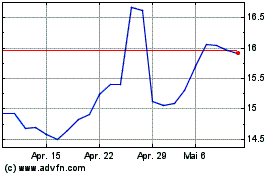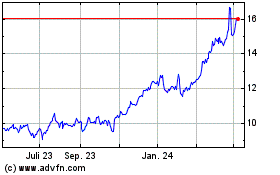Deutsche Bank Beats Expectations but Coronavirus Clouds Outlook--Update
29 April 2020 - 9:34AM
Dow Jones News
By Patricia Kowsmann
Deutsche Bank AG weathered the first weeks of the coronavirus
pandemic better than expected as customers rushed to reposition
their investments, boosting the German bank's investment-banking
revenue.
But the bank warned a sharp slowdown in the global economy will
hurt its loan book, and possibly its ability to sell unwanted
assets.
Deutsche Bank said it has set aside EUR506 million ($547
million) to cover credit losses, including EUR260 million directly
related to the virus. It said its liquidity reserves dropped 8% to
EUR205 billion in the quarter due to heavy client drawdowns on
committed credit facilities. The bank said it is still EUR43
billion above regulatory requirements. The capital cushion it has
to absorb future losses is also shrinking. Building it back up will
be difficult.
"This changed environment will impact Deutsche Bank's results of
operations, capital ratios and the capital plan that underlies our
targets," the bank said in a statement.
It said revenue is expected to be slightly lower in 2020
compared with last year, adding the outperformance in the first
quarter is offset by lowered expectations later in the year.
Provisions for credit losses, it said, are expected to increase
significantly from low levels.
The Frankfurt-based bank earlier this week disclosed its profit
for the three months ended March 31 fell 67% to EUR66 million, from
EUR201 million a year ago. The results, however, beat analysts'
expectations, thanks to a higher-than-expected revenue of EUR6.35
billion. Compared with the year-ago period, revenue was flat.
Shares in the bank soared after the announcement. Despite the
bank's shares falling 7% this year, it is still one of the best
performers among European lenders.
On Wednesday, the bank provided details behind those figures as
it officially reported its financial performance for the quarter.
It said revenue in its investment-banking business rose 18% from a
year-ago period to EUR2.3 billion. Its fixed-income trading
business did particularly well, as customers shifted their assets
around to better weather the virus storm, resulting in big fees and
commissions. Revenue at its corporate bank unit, which caters to
clients like midsize German companies, fell 1%. It rose 2% at its
private and retail banking.
Mark Fedorcik, head of the investment bank, said the unit was
doing well before the virus spread in Europe in March, with revenue
growth and market-share gains. Once the virus hit Europe and the
U.S., he said corporate clients focused on getting liquidity
through credit lines, issuance of debt in the markets and in some
cases loan waivers. Institutional investors, meanwhile,
repositioned their investment portfolios based on their risk
appetite.
"We are seeing some fixed-income markets normalize and stabilize
as we move to the end of April," Ram Nayak, head of fixed income,
said.
The bank remained on track with its cost-cutting drive, a key
part of a plan it launched last year meant to make it a leaner and
profitable bank focused on European companies and retail-banking
customers. Deutsche Bank reported costs fell 5% in the first
quarter.
Controlling costs is key for Deutsche Bank and other European
lenders given low and negative interest rates across the region
making it difficult to make money. Germany's banking system is also
the least profitable in the eurozone due to its overcrowded market
of more than 1,500 banks. Adding to the bank's woes is a massive
portfolio of unwanted assets, including derivatives, that it piled
up over several years of risky bets and that it is now trying to
sell or wind down. Excluding that unit, the bank said it expects
revenue to be flat this year.
Dealing with both cutting costs and controlling risk has become
even more challenging because of the coronavirus pandemic.
It could be difficult for the bank to continue slashing jobs in
Germany as the country enters what is expected to be a deep
recession. Mr. Sewing has promised to cut 18,000 of its
approximately 92,000 jobs by 2022. Last month, the bank paused
layoffs until some stability returns.
The risk in its loan portfolio is also rising, as borrowers
begin to struggle with the downturn. Germany's gross domestic
product is expected to shrink 7% this year, according to the
International Monetary Fund. The EUR506 million the bank has set
aside to cover credit losses is lower compared to U.S. peers, whose
profitability is much higher. But James von Moltke, Deutsche Bank's
financial chief, said he is comfortable with the quality of its
loan portfolio.
Investors are also paying close attention to the bank's capital
cushion to absorb future losses. Earlier this week, the bank said
because it was boosting lending to customers in need, its
capital-buffer ratio -- known as CET1 -- could "modestly and
temporarily" fall below its target of at least 12.5%. It was 12.8%
at the end of the quarter.
While still higher than the 10.4% regulatory minimum, analysts
say building the capital back up could be a challenge for the bank.
For one, shareholders may have little appetite to put more money
into a bank whose shares have been trading at historic lows since
last year.
"Deutsche Bank should try to maintain CET1 close to its previous
target of 12.5% for the market to remain comfortable in the current
challenging macro environment," JP Morgan analyst Kian Abouhossein
said.
Write to Patricia Kowsmann at patricia.kowsmann@wsj.com
(END) Dow Jones Newswires
April 29, 2020 03:19 ET (07:19 GMT)
Copyright (c) 2020 Dow Jones & Company, Inc.
Deutsche Bank (TG:DBK)
Historical Stock Chart
Von Mär 2024 bis Apr 2024

Deutsche Bank (TG:DBK)
Historical Stock Chart
Von Apr 2023 bis Apr 2024
